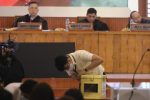Comelec en banc affirms 1st division’ dismissal of DQ case vs Marcos

file photo
The Commission on Elections (Comelec) en banc affirmed the decision of its First Division in April that President Ferdinand Marcos Jr. was qualified to run for office.
The ruling denied the partial motion for reconsideration earlier filed questioning the First Division’s findings that allowed Marcos to run for president in the May 2022 elections.
“There is no basis for petitioners to simply declare that the bases and reasoning of the First Division are clearly insufficient to justify such resolution and are contrary to law. Therefore, we find no cogent reason to disturb the findings of the Commission,” the en banc said.
The resolution, promulgated on October 7, 2022, was signed by Commissioners Socorro Inting, Marlon Casquejo, Aimee Ferolino and Rey Bulay. Comele chairperson George Garcia inhibited from the proceedings citing that the respondent was his former client.
In a statement, Comelec spokesperson Rex Laudiangco said the resolution of the en banc was final.
“If ever they want to appeal this, they need to go to the SC (Supreme Court) and file a petition for review on certiorari, either under Rule 64 or 65,” he said.
The partial motion filed for reconsideration filed in April 2022 sought anew to disqualify Marcos over tax-related cases in 1995 that “carried with it moral turpitude for which he should be disqualified from running and holding any public office.”
The petitioners included Margarita Salonga Salandanan, Crisanto Ducusin Palabay, Mario Flores Ben, Danilo Austria Consumido, Raoul Hafalla Tividad, Nida Mallare Gatchallan, and Nomer Calulot Kuan.
In denying the motion, the commissioners said “we found that it neither raised the grounds cited in Sec. 1 of Rule 19 of the Comelec Rules of Procedure, nor it raised new matters or issues that would convince us to consider the motion.”
The en banc added that the motion “hammered on the same issues and arguments” that have been earlier “properly addressed” by the First Division “after it conscientiously and painstakingly studied the facts and issues brought before it by the parties, and applied relevant law and jurisprudence.”
“We find that the Commission (First Division) correctly concluded that respondent’s subject repeated violations of law do not carry with it moral turpitude,” the en banc said.
“Petitioners were also unable to bring forth any legal basis that would explicitly support their argument. The Commission cannot interpret beyond what is stated explicitly in law and jurisprudence,” it added.






